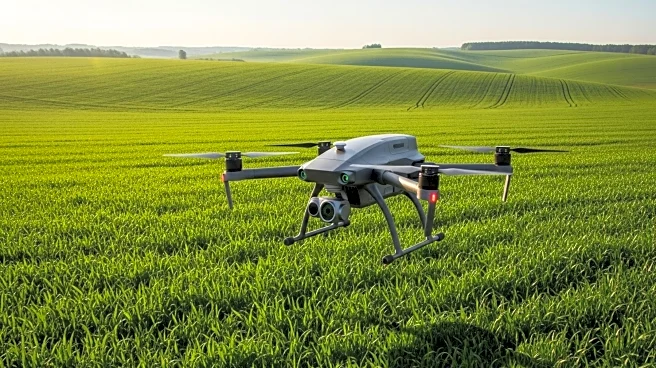What's Happening?
The U.S. precision farming market is experiencing significant growth, driven by the adoption of Internet of Things (IoT) technologies and advanced analytics. These innovations optimize farming inputs, labor, and costs, enhancing sustainable agricultural practices. The market, valued at USD 2.62 billion in 2023, is projected to grow at a CAGR of 9.5% from 2024 to 2030. Precision farming leverages data-driven decision-making, providing farmers with real-time insights into environmental variables such as soil moisture and temperature. This approach facilitates improved crop yield and resource management, positioning the U.S. as a major global hub for precision agriculture.
Why It's Important?
The expansion of precision farming in the U.S. is crucial for addressing challenges in agriculture, such as labor shortages and the need for sustainable practices. By utilizing IoT and advanced analytics, farmers can enhance productivity and profitability while reducing environmental impact. This technological shift supports large-scale farming operations and offers solutions for efficient resource management. The growth of precision farming also aligns with government incentives promoting modern agricultural technologies, potentially leading to increased investment and innovation in the sector. As precision farming becomes more prevalent, it could transform traditional farming methods, contributing to food security and environmental sustainability.
What's Next?
The precision farming market is expected to continue evolving with advancements in technology, such as drones, automation, and machine learning. These innovations will further enhance data collection and analysis, supporting more precise farming practices. As the market grows, stakeholders may see increased collaboration between technology providers and agricultural businesses to develop tailored solutions. Government policies and subsidies could play a role in accelerating adoption, particularly among smallholders. The industry may also witness a rise in partnerships with tech companies to expand rural connectivity and improve access to precision farming tools.
Beyond the Headlines
The rise of precision farming may have broader implications for rural communities and the agricultural workforce. As technology becomes integral to farming operations, there could be a shift in skill requirements, necessitating training and education programs for farmers. This transition may also influence rural economies, with potential job creation in tech support and data analysis roles. Additionally, precision farming could contribute to global efforts in combating climate change by promoting sustainable practices and reducing resource waste. The integration of AI and IoT in agriculture may also drive innovation in related fields, such as food processing and distribution.










